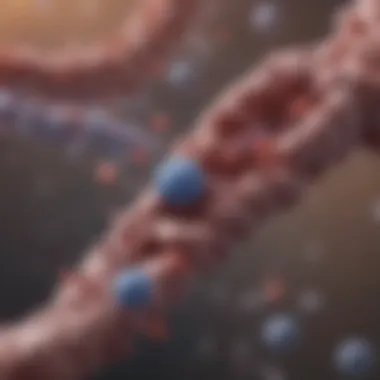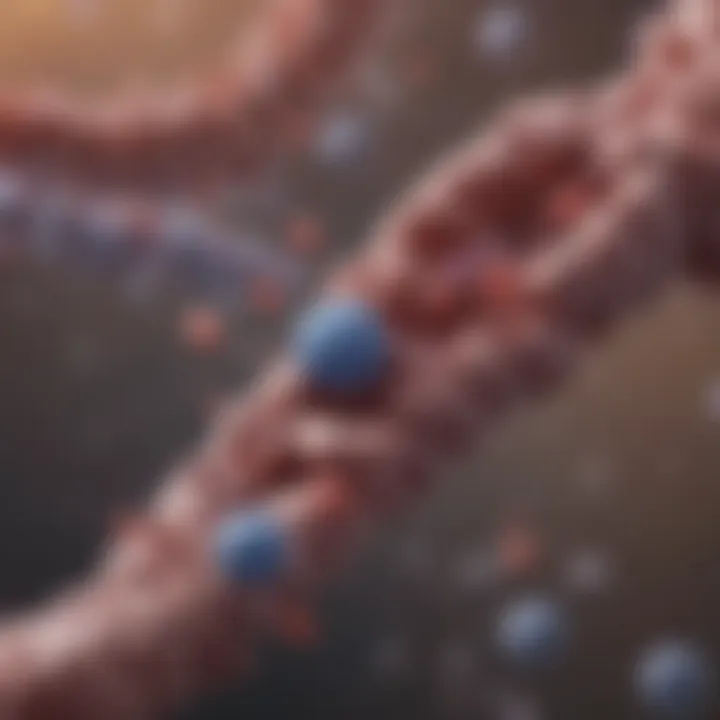Pharmacological Strategies for Colon Cancer Treatment


Overview of Research Topic
Brief Background and Context
Colon cancer is one of the leading causes of cancer-related deaths globally. It arises from the uncontrolled growth of cells in the colon or rectum, leading to tumors. The pathophysiology of colon cancer is influenced by a combination of genetic, environmental, and lifestyle factors. There are various stages of colon cancer, and each stage presents different treatment challenges. The diversity in tumor biology means that patients often have varied responses to therapies, making personalized medicine an increasingly relevant approach in treatment.
Importance in Current Scientific Landscape
In recent years, the treatment landscape for colon cancer has evolved significantly. Traditional therapies, such as surgery and chemotherapy, are now complemented by targeted therapies and immunotherapy. These advancements underscore the necessity to explore pharmacological approaches in detail. This is crucial not only for improving patient outcomes but also for addressing disparities in how patients respond to treatment. Research continues to uncover new therapeutic targets and the mechanisms of action of existing drugs.
Methodology
Research Design and Approach
This article adopts a systematic review approach. It compiles and analyzes recent literature on approved drugs and their mechanisms of action that are currently used in colon cancer treatment. The aim is to provide a thorough evaluation of existing pharmacological strategies while also highlighting emerging therapies that show promise.
Data Collection Techniques
Data collection was realized through comprehensive literature searches in reputable databases including PubMed and clinical trial registries. Relevant studies published in the last decade were examined, focusing on clinical trials, pharmacological reviews, and guidelines issued by oncological organizations. This provides a high-quality synthesis of available evidence, critical for understanding the evolving nature of colon cancer pharmacotherapy.
Prolusion to Colon Cancer
Colon cancer is a significant global health concern that impacts millions of individuals each year. Understanding colon cancer is crucial, as it informs prevention, early detection, treatment strategies, and management of the disease. This section will introduce the epidemiology of colon cancer, highlighting its prevalence and incidence across various demographics, as well as the risk factors that contribute to its development. Furthermore, we will examine the stages of colon cancer and its prognosis, which are instrumental in determining the treatment path and expected outcomes for patients.
Epidemiology and Risk Factors
Colon cancer, also known as colorectal cancer, ranks as one of the most commonly diagnosed cancers worldwide. The American Cancer Society estimates that there will be over 150,000 new cases in the United States alone this year. Factors such as age, family history, and lifestyle choices play a notable role in the likelihood of developing this disease.
Key risk factors include:
- Age: The risk increases significantly after the age of 50.
- Family History: Individuals with close relatives who have had colon cancer are at a higher risk.
- Genetic Syndromes: Conditions like Lynch syndrome and familial adenomatous polyposis greatly increase susceptibility.
- Diet: High consumption of red and processed meats, along with low intake of fruits and vegetables, can elevate risk.
- Lifestyle Choices: Sedentary lifestyle, obesity, smoking, and excessive alcohol consumption are also linked to higher rates of colon cancer.
Recognizing these risk factors is essential for targeted screening protocols and preventive measures.
Colon Cancer Stages and Prognosis
The staging of colon cancer is a vital aspect of treatment planning. The stages range from Stage 0 to Stage IV, indicating how far the cancer has progressed.
- Stage 0: Cancer is confined to the innermost lining of the colon.
- Stage I: Cancer has penetrated the colonic wall but has not spread to the lymph nodes.
- Stage II: Cancer has grown through the wall of the colon and may reach nearby tissues but not lymph nodes.
- Stage III: Cancer has spread to nearby lymph nodes.
- Stage IV: Cancer has metastasized to distant parts of the body, indicating a more advanced stage with a poorer prognosis.
The prognosis for colon cancer varies significantly depending on the stage at diagnosis. Early detection generally correlates with better outcomes, which underscores the importance of screening. Statistics indicate that the five-year survival rate can exceed 90% for localized cases, while it decreases dramatically for metastatic cases. Understanding the stages of colon cancer aids in treatment decisions and sets realistic expectations for patients and their families.
Approximately 70% of colon cancers are diagnosed at stages III or IV, making early detection crucial.
Current Pharmacological Treatments
The treatment of colon cancer has evolved significantly, with a variety of pharmacological options available. Understanding these treatments is essential for optimizing patient care and outcomes. Current pharmacological treatments encompass cytotoxic chemotherapy, targeted therapies, and immunotherapies. Each of these categories offers distinctive mechanisms of action and therapeutic benefits, tailoring the approach to individual patient needs.
Cytotoxic Chemotherapy
Cytotoxic chemotherapy has been a cornerstone in the treatment of colon cancer. This approach aims to destroy cancer cells by targeting rapidly dividing cells. The following drugs are notable in this category.
Fluorouracil
Fluorouracil, often abbreviated as 5-FU, is a first-line agent in the treatment of advanced colon cancer. One of its key characteristics is its ability to interfere with DNA synthesis, which impedes cancer cell proliferation. This makes Fluorouracil a popular choice for combination regimens, enhancing overall efficacy.
While it has notable impact, its side effects can be significant, including myelosuppression and gastrointestinal disturbances. Thus, patients should be monitored closely during treatment.
Leucovorin
Leucovorin cannot be overlooked in colon cancer therapy. Its primary role is to enhance the effectiveness of Fluorouracil. Leucovorin is a reduced form of folic acid that promotes the incorporation of Fluorouracil into the RNA, thereby increasing its cytotoxic effects. This synergistic relationship between Leucovorin and Fluorouracil can improve treatment outcomes.
However, it is essential to note that the administration of Leucovorin must be carefully timed, as improper scheduling can diminish its benefits.


Oxaliplatin
Oxaliplatin is a platinum-based chemotherapeutic agent used extensively in colon cancer treatment. It works by forming cross-links in the DNA, leading to apoptosis of cancer cells. The key advantage of Oxaliplatin lies in its effectiveness against patients with advanced disease who may have developed resistance to other therapies.
Nonetheless, Oxaliplatin's use can be limited by neuropathy, which may result in significant patient discomfort. Therefore, a careful risk-benefit assessment is crucial for its administration.
Irinotecan
Irinotecan is another important chemotherapeutic agent that inhibits DNA topoisomerase I, thereby preventing DNA repair and replication. This feature makes it particularly effective in certain patient subsets. Irinotecan is often used in combination regimens to enhance its efficacy against colon cancer.
However, the side effects, like diarrhea and myelosuppression, necessitate vigilant monitoring, as these can compromise patient quality of life.
Targeted Therapy
Targeted therapies represent a paradigm shift in colon cancer treatment, offering a more personalized approach. These drugs act on specific molecular targets related to cancer growth and progression. Key agents in this category are:
Bevacizumab
Bevacizumab is a monoclonal antibody targeting vascular endothelial growth factor (VEGF). By inhibiting VEGF, Bevacizumab reduces tumor vascularization, which is vital for tumor growth. Its use has proven beneficial in combination with chemotherapy, leading to improved overall survival in advanced cases.
However, potential adverse effects include hypertension and increased risk of bleeding, warranting careful patient selection.
Cetuximab
Cetuximab is another monoclonal antibody that targets the epidermal growth factor receptor (EGFR). It is particularly effective in colorectal cancer patients with wild-type KRAS genes. The key characteristic of Cetuximab is its ability to inhibit downstream signaling pathways, leading to decreased cell proliferation and survival.
Yet, skin toxicities are common side effects, which can significantly impact patient comfort.
Panitumumab
Panitumumab, like Cetuximab, targets the EGFR but has a different binding mechanism. It is effective for patients with KRAS wild-type tumors, offering another option for those not responding to traditional chemotherapy. Panitumumab can improve overall survival when used in appropriate settings.
An important consideration is the potential for allergic reactions, which necessitates monitoring during infusion.
Regorafenib
Regorafenib is a small molecule inhibitor targeting multiple pathways involved in tumor growth, including VEGF and angiogenesis. It’s used for patients who have progressed following standard treatments, making it a valuable option in later line therapies.
However, its side effects, including fatigue and liver function abnormalities, require careful management to optimize therapeutic benefit.
Immunotherapy
Immunotherapy has emerged as an exciting frontier in the treatment of malignancies, including colon cancer. It aims to harness the body’s immune system to recognize and eliminate cancer cells. Key treatments include:
Checkpoint Inhibitors
Checkpoint inhibitors, such as pembrolizumab and nivolumab, have shown promise in patients with mismatch repair deficiency or microsatellite instability-high colon cancers. These agents work by blocking proteins that inhibit T-cell activation, allowing the immune system to more effectively attack cancer cells.
Their introduction has revolutionized treatment, particularly in cases resistant to traditional approaches.
CAR T-cell Therapy
Chimeric Antigen Receptor (CAR) T-cell therapy is an innovative approach involving the modification of patient’s T-cells to target specific cancer antigens. While primarily used for hematological malignancies, research is ongoing to determine its efficacy in solid tumors, including colon cancer. The unique feature of CAR T-cell therapy is its potential for durable responses; however, challenges remain regarding its application in solid tumors.
Mechanisms of Action of Drugs
Understanding the mechanisms of action of drugs in the treatment of colon cancer is fundamental for optimizing therapeutic strategies. Knowing how these drugs interact with cancer cells can lead to better clinical outcomes and the development of more effective therapies. The complexity of colon cancer necessitates a multifaceted approach to treatment. Each class of pharmacological agents behaves differently, affecting tumor cells through unique biochemical pathways. This section delves into various mechanisms, offering insight into how these drugs achieve their effects.
Chemotherapeutic Mechanisms
Chemotherapeutic agents, often the cornerstone of cancer therapy, operate by disrupting the processes essential for cancer cell survival and replication. Most of these drugs target rapidly dividing cells, which is characteristic of tumor behavior.
Some important mechanisms include:
- Alkylation: Some drugs covalently bond to DNA, leading to cross-linking. This prevents DNA replication and transcription.
- Antimetabolites: These mimic the building blocks of DNA and RNA, incorporating themselves into the nucleic acids. This incorporation leads to faulty DNA that cannot support cell proliferation.
- Topoisomerase Inhibitors: These interfere with the enzymes that manage DNA strand separation. By preventing the DNA from unwinding properly, these agents halt replication and can induce cell death.


A notable example of a chemotherapeutic agent is Fluorouracil, which functions as an antimetabolite. It interferes with DNA synthesis by inhibiting thymidylate synthase, ultimately starving the tumor cells of necessary components for proliferation.
Mechanisms of Targeted Agents
Targeted therapies represent a sophisticated approach tailored to exploit specific molecular targets within cancer cells. These agents aim to block the molecular abnormalities driving cancer growth while sparing normal cells.
Mechanisms of action for targeted therapies include:
- Inhibition of Growth Factor Receptors: For instance, agents like Cetuximab block the epidermal growth factor receptor (EGFR), which is overactive in many colon cancers. By doing so, these agents disrupt signaling pathways that promote tumor cell proliferation.
- Blocking Angiogenesis: Bevacizumab is another targeted agent that inhibits vascular endothelial growth factor (VEGF). This inhibition prevents the formation of new blood vessels that tumors require for continued growth and metastasis.
An understanding of these mechanisms is crucial, as it enables clinicians to combine therapies effectively based on the specific characteristics of the tumor.
Immunological Mechanisms of Action
Immunotherapies use the body's immune system to fight cancer. Understanding their mechanisms sheds light on their potential efficacy and the factors influencing patient response.
Key immunological mechanisms include:
- Checkpoint Inhibition: Drugs such as Checkpoint Inhibitors re-activate immune responses by blocking proteins that normally downregulate immune activity. This can enhance the ability of T-cells to target and destroy cancer cells.
- CAR T-cell Therapy: This innovative approach involves modifying a patient's own T-cells to better recognize and combat cancer. These engineered cells are infused back into the patient, offering a potent method for harnessing the immune system's power against colon cancer.
As we observe these mechanisms, it is clear that the evolution of pharmacotherapy in colon cancer relies on a strong foundation of understanding how drugs interact at the molecular level, ultimately guiding us toward more effective treatment options.
Emerging Therapies and Clinical Trials
Emerging therapies and clinical trials are crucial components in the ongoing battle against colon cancer. As treatment landscapes evolve, exploring new pharmaceuticals becomes paramount. Clinicians and researchers strive to enhance patient outcomes by investigating novel approaches. Increased understanding of colon cancer biology can lead to more effective management strategies. These developments hold the promise of tailored therapies that target specific tumor characteristics.
Novel Chemotherapeutic Agents
In the quest for better colon cancer treatments, novel chemotherapeutic agents are at the forefront. These new drugs often operate on mechanisms distinct from traditional chemotherapy. Researchers aim to minimize toxicity while maximizing effectiveness, addressing the pressing need for alternatives.
One of the promising agents under investigation is Trifluridine/tipiracil. It shows efficacy in patients with previously treated metastatic colon cancer. Unlike older chemotherapeutics, it demonstrates a more favorable side effect profile. Early clinical trials have shown some positive outcomes in terms of overall survival rates, highlighting its potential as a viable option.
Advanced Targeted Therapies
Advanced targeted therapies represent a significant shift in colon cancer treatment paradigms. These drugs focus on specific molecular targets related to cancer cell growth, thereby avoiding damage to healthy cells. This selectivity often results in improved treatment tolerability.
For instance, Niraparib is being studied for patients with specific genetic profiles, particularly those with mismatch repair deficiencies. This targeted approach not only increases the effectiveness of treatment but also opens doors for combining it with immunotherapies effectively.
The integration of precision medicine in advanced targeted therapies underscores the individualized nature of modern oncology. Clinical trials provide invaluable data, shaping how these therapies can be best utilized based on genetic expression in tumors.
Post-Approved Drug Innovations
Post-approved drug innovations involve altering previously approved drugs to enhance their effectiveness or reduce side effects. These modifications can lead to new therapeutic options for patients.
A notable example is Oxaliplatin, which has shown improvements in formulation. Such innovations aim to reduce neurotoxicity associated with its use. Modifications of existing drugs can expand their applicability and enhance patient adherence to treatment regimens.
Further research into repurposing older medications shows promising potential. The possibility of using Metformin, typically utilized in diabetes, in combination with chemotherapy is being explored as well. This finding encapsulates how established medications can contribute to evolving treatment strategies in colon cancer.
"Emerging therapies and clinical trials are shaping the future of colon cancer treatment. These innovations pave the way for individualized approaches that were previously unimaginable."
Personalized Medicine in Colon Cancer
Personalized medicine plays a crucial role in enhancing the treatment of colon cancer. With the understanding that each patient's cancer manifests uniquely, this approach tailors therapies based on individual characteristics. Pharmacological interventions are no longer one-size-fits-all; instead, they are becoming increasingly precise. This shift not only aims to improve outcomes for patients but also seeks to minimize the side effects commonly associated with cancer treatments.
Pharmacological strategies must take genetic, molecular, and environmental factors into account to optimize efficacy. The practice of personalized medicine involves using diagnostic tests that identify specific mutations or biomarkers linked to colon cancer. Such insights empower healthcare professionals to choose the most appropriate therapeutic agents, allowing for better response rates and improved quality of life for patients.
The benefits of this tailored approach are multifaceted. Personalized medicine can lead to more effective treatment plans, reducing the usage of ineffective drugs and avoiding unnecessary adverse reactions. It also enhances patient adherence to treatment regimens and fosters a stronger sense of trust in medical guidance. Overall, the implications are profound, encouraging not only better health outcomes but also advancing research towards more sophisticated cancer therapies.
Role of Genetic Profiling
Genetic profiling represents a cornerstone in the realm of personalized medicine for colon cancer. By assessing genetic variations that contribute to cancer progression, oncologists can tailor their approaches more precisely.
- Understanding Mutations: Genetic profiling identifies mutations in genes such as KRAS, NRAS, and BRAF, which are commonly associated with colon cancer. This information is vital in selecting targeted therapies.
- Predicting Treatment Response: Profiling can assist in predicting how a tumor will respond to certain treatments. For instance, patients with specific mutations might not benefit from certain targeted therapies designed for other genetic profiles.
- Monitoring Disease Progression: Regular updates in genetic profiling can also help track the evolution of the tumor, providing insights that guide ongoing treatment adjustments.
The continuous refinement of genetic tests is leading to more precise screening methodologies. This progress is essential in ensuring that patients receive the most effective therapies tailored specifically for their cancer.


Biomarkers for Treatment Selection
Biomarkers are pivotal in refining treatment selection strategies in colon cancer. These biological molecules indicate the disease's presence or progression and are significant in determining the most effective therapies available.
- Identifying Suitable Treatments: Biomarkers can indicate which patients are likely to benefit from specific treatments. For instance, if a tumor expresses the HER2 protein, patients may be candidates for HER2-targeting therapies.
- Assessing Prognosis: Certain biomarkers can also offer prognostic information. They help in determining the likelihood of recurrence or survival, thus guiding professional decision-making regarding the aggressiveness of treatment.
- Personalized Drug Response: New drugs are being developed that specifically target identified biomarkers. As research advances, this aspect of pharmacological therapy will likely expand, improving patient outcomes.
"Personalized medicine represents the future of colon cancer treatment, addressing the unique genetic landscape of tumors."
Given the combination of genetic profiling and biomarker assessments, healthcare professionals are better equipped to navigate treatment options, optimizing both efficacy and patient comfort. As research continues to evolve in this field, the integration of personalized medicine stands to redefine standard practices in colon cancer treatment.
Challenges in Treatment
In the pursuit of effective pharmacological interventions for colon cancer, understanding the challenges inherent to treatment is crucial. This section delves into two primary aspects affecting treatment efficacy: drug resistance mechanisms and adverse effects of therapies. Analyzing these challenges provides insight for developing strategies to improve patient outcomes and further personalize treatment plans.
Drug Resistance Mechanisms
Drug resistance in colon cancer remains a significant hurdle in achieving optimal therapeutic results. This phenomenon occurs when cancer cells evolve to withstand the effects of treatments that previously target them effectively. There are several key mechanisms behind drug resistance:
- Genetic mutations: Alterations in genes such as KRAS and BRAF often contribute to resistance against targeted therapies.
- Drug efflux: Increased activity of efflux pumps, like P-glycoprotein, can lead cancer cells to expel drugs, diminishing their effectiveness.
- Cell survival pathways: Certain pathways, such as those involving the anti-apoptotic protein Bcl-2, assist cells in evading death triggered by chemotherapeutic agents.
- Tumor microenvironment: Factors within the tumor's surroundings can alter drug efficacy by promoting cell survival and limiting drug uptake.
The existence of these mechanisms emphasizes the need for ongoing research and development of new therapeutics capable of overcoming resistance. Analyzing patient-specific genetic profiles can lead to targeted interventions, thus enhancing treatment efficacy.
Adverse Effects of Treatments
Adverse effects pose another considerable challenge in the pharmacological treatment of colon cancer. The side effects of chemotherapy, immunotherapy, and targeted therapies can significantly impact a patient's quality of life and treatment adherence. Common adverse effects include:
- Gastrointestinal issues: Nausea, vomiting, and diarrhea are predominant and can lead to dehydration and nutritional deficiencies.
- Hematological complications: Neutropenia (low white blood cell count) can increase infection risk, requiring careful monitoring.
- Fatigue: Patients often experience chronic fatigue which can influence their overall functioning and well-being.
- Skin reactions: Many targeted therapies can cause dermatological issues, including rashes or peeling skin.
Addressing these adverse effects is critical for maintaining a patient's quality of life during treatment. Close monitoring and supportive care can mitigate some symptoms. Advances in pharmacogenomics also provide opportunities to tailor treatments that minimize adverse reactions.
"Understanding the challenges in treating colon cancer is essential for developing effective strategies to improve patient outcomes in the long term."
Future Directions in Research
Research into colon cancer treatment is crucial to overcoming the present challenges faced by patients and healthcare providers. As this article highlights various pharmacological avenues, it is vital to consider the future of drug development and the integration of different medical disciplines. Understanding these directions allows for improved treatment strategies, fostering a more effective response to this type of cancer.
Innovations in Drug Development
Innovative drug development is essential in the fight against colon cancer. New agents are designed to target the unique pathways involved in cancer progression. For instance, novel small molecules and biologics are being researched to overcome specific resistance mechanisms that cancer cells might develop. The field is also exploring combination therapies that leverage both established and emerging agents to enhance efficacy.
Here are some areas of focus:
- Targeted Therapies Expansion: New targeted agents are being studied that can attack specific mutations found in tumor cells. Drugs targeting BRAF, for example, show promise in certain patients.
- Drug Repurposing: Some researchers are looking into existing medications, not traditionally associated with cancer treatment, to see if they can provide benefits to colon cancer patients.
- Nanotechnology: This innovative approach enhances drug delivery directly to tumor sites, minimizing systemic toxicity while maximizing the therapeutic impact.
"Future medications may not only focus on destroying cancer cells but also on strengthening the body's immune response to prevent recurrence."
Integration of Multidisciplinary Approaches
Integrating multiple specialties in colon cancer research is increasingly recognized as vital for advancing treatment. A multidisciplinary approach brings together oncologists, geneticists, pathologists, and researchers to develop comprehensive strategies for managing the disease.
Benefits of this integration include:
- Holistic Patient Care: Leveraging insights from various disciplines ensures that treatment plans consider all aspects of patient health, leading to personalized management.
- Enhanced Research Outcomes: Collaboration can streamline research efforts, allowing for quicker translation of findings from the lab to the clinic.
- Education and Training: Future practitioners can benefit from multidisciplinary training programs, equipping them with a broader understanding of the complexities involved in colon cancer.
Culmination
The successful management of colon cancer rests heavily on the understanding and application of pharmacological approaches. The complexity of this disease demands a multifaceted treatment strategy that takes into consideration individual patient characteristics and tumor biology. As evidenced by the various therapies outlined in this article, a broad spectrum of pharmacological options exists, each with unique mechanisms of action and varying efficacy across different stages of the disease.
Summary of Current Treatment Landscape
In recent years, the treatment landscape for colon cancer has evolved significantly. Currently, the mainstay of treatment includes cytotoxic chemotherapy agents such as Fluorouracil, Leucovorin, Oxaliplatin, and Irinotecan, combined with targeted therapies like Bevacizumab and Cetuximab. These treatments focus on disrupting cancer cell proliferation and promoting apoptosis. Additionally, immunotherapy options, particularly checkpoint inhibitors, have shown promise, enhancing the body’s immune response against cancer cells. This highlights the continuous progression in our understanding of tumor behavior and how therapies can adapt to meet these challenges.
Despite the advances in pharmacological interventions, limitations remain. Drug resistance, often due to genetic mutations in tumors, complicates treatment outcomes. Adverse reactions to drugs can also impact patient quality of life and treatment adherence. Therefore, ongoing research and clinical trials are essential for refining existing therapies and developing novel agents that tackle these issues.
Implications for Future Treatments
Looking forward, the implications of current findings are vast. Personalized medicine is set to revolutionize how colon cancer is treated. By leveraging genetic profiling and identifying specific biomarkers, physicians can tailor treatments to match patient profiles. This approach not only increases the likelihood of treatment success but also reduces potentially harmful side effects from ineffective therapies.
Moreover, the future of colon cancer treatment could include enhanced combinations of existing therapies and the introduction of entirely new classes of drugs. Techniques such as gene editing and targeted delivery systems are emerging as potential game-changers in drug development. Ultimately, the strategic integration of these innovations will lead to a more effective treatment landscape and improved patient outcomes.
Continued advancements in pharmacological treatments are crucial for addressing the challenges of colon cancer. The emphasis on personalized approaches will mark a notable shift in the standard of care, impacting patient prognoses and quality of life.



